|
|
The Way of
the Cross at the Colosseum
With the Holy Father, Benedict XVI Joseph Alois Ratzinger, Presiding
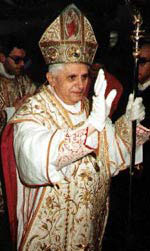
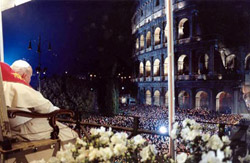 As every year on the evening of Good Friday, the liturgical commemoration of
the Lord's Passion, the Church of God in Rome, guided by its Pastor, the
Successor of Peter, participates in the devotional practice of the Way of
the Cross at the Colosseum. Pilgrims from the worldwide household of God
walk with the Christian community in Rome along the fourteen stations while
millions of faithful of every language, people and culture take part in the
prayers and meditations through radio and television broadcasts. A
felicitous coincidence of calendars this year has the Christians of East and
West celebrating simultaneously the great mystery of our one Lord's Passion,
Death and Resurrection. All are therefore able to take part simultaneously
in the commemoration of the founding event of their faith. As every year on the evening of Good Friday, the liturgical commemoration of
the Lord's Passion, the Church of God in Rome, guided by its Pastor, the
Successor of Peter, participates in the devotional practice of the Way of
the Cross at the Colosseum. Pilgrims from the worldwide household of God
walk with the Christian community in Rome along the fourteen stations while
millions of faithful of every language, people and culture take part in the
prayers and meditations through radio and television broadcasts. A
felicitous coincidence of calendars this year has the Christians of East and
West celebrating simultaneously the great mystery of our one Lord's Passion,
Death and Resurrection. All are therefore able to take part simultaneously
in the commemoration of the founding event of their faith.
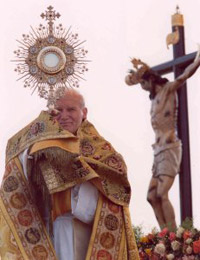 This year the biblical texts for the Way of the Cross are taken from the
Gospel of Luke and the meditation texts and prayers were composed by Abbot
André Louf, a Cistercian monk of strict observance who is now living in a
hermitage after exercising his ministry as Abbot in his community of
Notre-Dame of Mont-des-Cats in France for thirty-five years, guiding it in
the footsteps of Jesus Christ from the years of the Second Vatican Council
to the threshold of the third millennium. He is a monk steeped in the
Scriptures thanks to the daily practice of the lectio divina, an avid reader
of the Church Fathers of the first centuries and of the Flemish mystics, a
father of monks who is able to accompany his brothers in their spiritual
life and in the daily quest for that "one heart and soul" that was
characteristic of the apostolic community of Jerusalem. He is, then, a
cenobite monk for whom solitude and communion are in constant existential
converse: solitude before God and fraternal communion, inner unification and
community unity, reducing all to the simplicity of what is essential and to
the opening up to the varied expressions of a living faith. This is the
daily undertaking of the monk, the dynamic of his stability in a specific
community reality, the "work of obedience" (Rule of St. Benedict, prol. 2)
by which a return is made to God. This year the biblical texts for the Way of the Cross are taken from the
Gospel of Luke and the meditation texts and prayers were composed by Abbot
André Louf, a Cistercian monk of strict observance who is now living in a
hermitage after exercising his ministry as Abbot in his community of
Notre-Dame of Mont-des-Cats in France for thirty-five years, guiding it in
the footsteps of Jesus Christ from the years of the Second Vatican Council
to the threshold of the third millennium. He is a monk steeped in the
Scriptures thanks to the daily practice of the lectio divina, an avid reader
of the Church Fathers of the first centuries and of the Flemish mystics, a
father of monks who is able to accompany his brothers in their spiritual
life and in the daily quest for that "one heart and soul" that was
characteristic of the apostolic community of Jerusalem. He is, then, a
cenobite monk for whom solitude and communion are in constant existential
converse: solitude before God and fraternal communion, inner unification and
community unity, reducing all to the simplicity of what is essential and to
the opening up to the varied expressions of a living faith. This is the
daily undertaking of the monk, the dynamic of his stability in a specific
community reality, the "work of obedience" (Rule of St. Benedict, prol. 2)
by which a return is made to God.
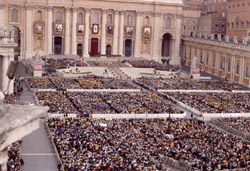 The texts of this Way of the Cross are filled with this liberating monastic
labour, which is also the labour of every baptized member of the living
community of the Church. Jesus is often found alone, sometimes by his free
choice, other times because everyone has abandoned him: he is alone in the
Mount of Olives, face to face with the Father; he is alone in facing the
betrayal of one of his disciples and in the denial of another of their
number; he faces the Sanhedrin alone, the judgment of Pilate, the scorn of
the soldiers; alone he takes up the weight of the cross; alone he abandons
himself totally to the arms of his Father. The texts of this Way of the Cross are filled with this liberating monastic
labour, which is also the labour of every baptized member of the living
community of the Church. Jesus is often found alone, sometimes by his free
choice, other times because everyone has abandoned him: he is alone in the
Mount of Olives, face to face with the Father; he is alone in facing the
betrayal of one of his disciples and in the denial of another of their
number; he faces the Sanhedrin alone, the judgment of Pilate, the scorn of
the soldiers; alone he takes up the weight of the cross; alone he abandons
himself totally to the arms of his Father.
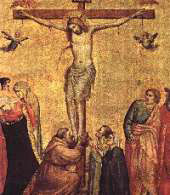 But Jesus' solitude is not fruitless, quite the contrary: since it arises
from an intimate union with the Father and the Spirit, it in turn creates
communion in those who enter into a living relationship with it. Thus in his
Passion Jesus encounters the fraternal support of the Cyrenean; he
recognizes the consolation of the women disciples who have come up to
Jerusalem with him; he opens the doors of his Kingdom to the centurion and
to the good thief, who are able to look beyond appearances; he sees the
beginnings of the community taking place at the foot of the cross, being
formed by his mother and the beloved disciple. Finally, the precise moment
of what seems to be his greatest solitude, when he is laid in the tomb, when
his body is swallowed by the earth, becomes the passage towards a renewed
cosmic community: having descended to the underworld, Jesus meets all of
humanity in Adam and Eve, announces salvation to "the spirits in prison" (1
Pet 3:19) and re-establishes the community of paradise. But Jesus' solitude is not fruitless, quite the contrary: since it arises
from an intimate union with the Father and the Spirit, it in turn creates
communion in those who enter into a living relationship with it. Thus in his
Passion Jesus encounters the fraternal support of the Cyrenean; he
recognizes the consolation of the women disciples who have come up to
Jerusalem with him; he opens the doors of his Kingdom to the centurion and
to the good thief, who are able to look beyond appearances; he sees the
beginnings of the community taking place at the foot of the cross, being
formed by his mother and the beloved disciple. Finally, the precise moment
of what seems to be his greatest solitude, when he is laid in the tomb, when
his body is swallowed by the earth, becomes the passage towards a renewed
cosmic community: having descended to the underworld, Jesus meets all of
humanity in Adam and Eve, announces salvation to "the spirits in prison" (1
Pet 3:19) and re-establishes the community of paradise.
For every
disciple of Jesus Christ, participating in the Way of the Cross means
entering into the mystery of solitude and communion experienced by our
Master and Lord, accepting the will of the Father for us all, until we are
able to see, beyond the suffering and death, the life without end that
bursts forth from the pierced side and the empty tomb.
|
 |
 |



